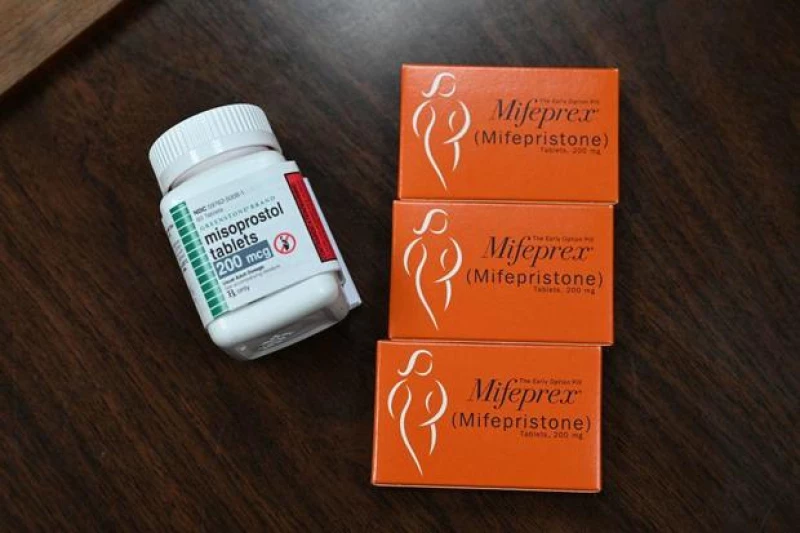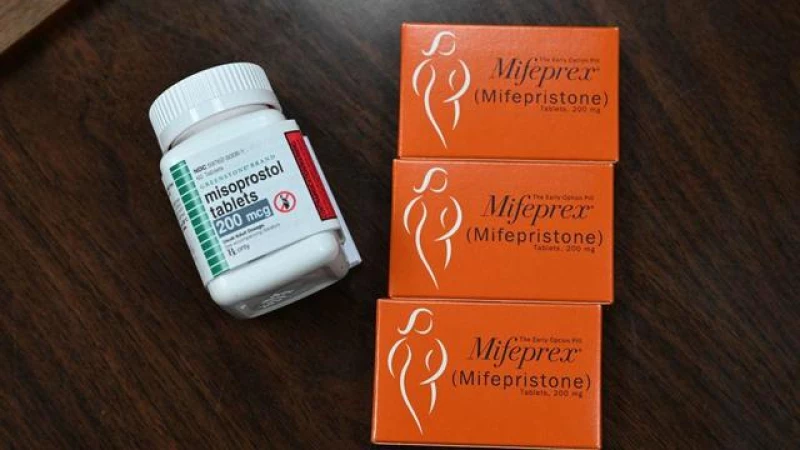Supreme Court to Hear Case on Access to Abortion Pill
Washington — The Supreme Court is scheduled to convene on Tuesday to listen to arguments in a lawsuit concerning a widely used abortion pill and recent decisions made by the Food and Drug Administration to simplify the process of obtaining the medication.
The focal point of the legal dispute is the pill mifepristone, which, when combined with another drug, is utilized to end an early pregnancy. Since its approval by the FDA in 2000, over 5 million patients have used mifepristone, as per the agency's data, and studies referenced in court documents have demonstrated its safety and efficacy.
In recent times, the FDA has implemented various measures to enhance the accessibility of mifepristone, such as permitting its usage up to 10 weeks into a pregnancy and enabling it to be delivered via mail without requiring an in-person consultation with a doctor. These actions, undertaken in 2016 and 2021, have faced legal scrutiny following allegations from a coalition of anti-abortion doctors and medical organizations asserting that the FDA breached the law by easing the restrictions.
The Supreme Court to Review Decision Impacting Access to Mifepristone
The Supreme Court is set to review a decision from a federal appeals court that found the agency's actions were unlawful. A ruling unwinding those changes would threaten to curtail access to mifepristone nationwide, even in states with laws protecting abortion access.
Access to mifepristone has remained unchanged while legal proceedings in the case have continued, since the high court issued an order last April preserving its availability. That relief will remain in place until the Supreme Court hands down its decision, expected by the end of June.
Arguments in the case are taking place less than two years after the Supreme Court ruled to unwind the constitutional right to abortion and return the issue to the states. And the dispute is not the only one involving abortion that the justices will consider within the next month — a second case involves whether federal law requires emergency room doctors in states that ban abortion to perform the procedure on pregnant patients whose lives are at risk.
The court's consideration also comes on the heels of new findings that medication abortions in the U.S. have risen since the Supreme Court overturned Roe v. Wade.
In a study released on Monday, it was revealed that the use of self-managed abortions through pills increased in the six months following the reversal of Roe v. Wade. Research conducted by the Guttmacher Institute indicated that medication abortions made up 63% of all abortions within the U.S. healthcare system in 2023, a significant rise from 53% in 2020.
The controversy surrounding mifepristone
The FDA's regulations regarding mifepristone were challenged in November 2022, over twenty years after the drug became available in the United States. The challenge was brought forth in a federal court in Texas by a coalition of medical associations opposed to abortion rights, primarily led by the Alliance for Hippocratic Medicine. They contested the FDA's original approval in 2000 and subsequent modifications in 2016 and 2021.
These changes included extending the timeframe for taking mifepristone up to 10 weeks into pregnancy, reducing the required in-person visits from three to one, expanding the pool of healthcare providers authorized to prescribe the drug, and eliminating the necessity for in-person prescription.
Represented by the conservative legal organization Alliance Defending Freedom, the opposing medical groups argued that the FDA lacked the jurisdiction to approve mifepristone for distribution and did not sufficiently assess its safety and efficacy.
U.S. District Judge Matthew Kacsmaryk, presiding over the case, concurred that the FDA's actions in 2000 and subsequent decisions were likely illegitimate. As a result, he issued an injunction against the FDA's initial authorization for the sale of the drug in the United States.
But Kacsmaryk put his ruling on hold for a week, and a federal appeals court and the Supreme Court intervened. The high court ultimately maintained access to mifepristone while legal proceedings continued.
Months later, the U.S. Court of Appeals for the 5th Circuit upheld the FDA's 2000 approval of the abortion pill, but said the agency violated the law with its more recent changes. The appeals court's decision, though, is preempted by the Supreme Court's earlier April 2023 order protecting access.
The Justice Department and Danco Laboratories — the maker of Mifeprex, the brand-name version of mifepristone — asked the Supreme Court to review the 5th Circuit's ruling, and it agreed to do so in December.
The arguments in the case

In asking the justices to reverse the appeals court's decision, the Biden administration has argued that the medical associations and their physician members have failed to show that they may be injured by the FDA's actions, and that those alleged injuries can be traced to the FDA's easing of the rules for mifepristone.
The doctors challenging the changes do not prescribe the drug and haven't identified a single case where a member has been forced to complete an abortion for a woman who shows up at an emergency room with an ongoing pregnancy, Solicitor General Elizabeth Prelogar told the court in filings.
However, attorneys for the medical organizations, represented by the Alliance Defending Freedom, contended that their members oppose not just abortion but also any involvement in the process.
"FDA has spent years sending women who have suffered from abortion drugs to the emergency room. Many of these women have sought help from the doctors involved," the attorneys stated. "Now that the FDA is being held accountable for the harm caused, it cannot claim that the treatment option it recommended is merely speculative."
If the Supreme Court sides with the Justice Department in arguing that the doctors lack the appropriate grounds to file a lawsuit in federal court, the case would be dismissed without a ruling on whether the FDA acted within legal boundaries in changing the guidelines for mifepristone's usage.
However, if the justices delve into the legal matters raised in the case, the Justice Department and Danco have asked the court to affirm that the FDA's actions in 2016 and 2021 were lawful.
Prelogar mentioned that the agency based its decision on a "substantial body of medical research" regarding the use of mifepristone over the years when concluding that the 2016 modifications would be safe. Additionally, she argued that it was inappropriate for the district court to challenge the FDA's determinations, which Congress had authorized the agency to make.
"To the government's knowledge, this case marks the first time any court has restricted access to an FDA-approved drug by second-guessing FDA's expert judgment about the conditions required to assure that drug's safe use," Prelogar wrote.
Pharmaceutical companies and former heads of the FDA have warned the court that a decision upholding the 5th Circuit threatens to undermine the agency's drug-approval process and could lead to persistent legal challenges of its approval decisions.
The lower court's approach, if left intact, "would allow courts to substitute their lay analysis for FDA's scientific expertise and to overturn the agency's approval and conditions of use for drugs — even after they have been on the market for decades," a group of former commissioners and acting commissioners told the court in a brief.
"The resulting uncertainty would threaten the incentives for drug companies to undertake the time-consuming and costly investment required to develop new drugs and ultimately hinder patients' access to critical remedies that prevent suffering and save lives," they said.
A slew of pharmaceutical companies and executives separately stressed the importance of drug companies being able to rely on the courts to respect the FDA's scientific judgements.
"In a brief, it was stated that if a court can overturn judgments many years later without scientific rigor, it will create intolerable risks and undermine investment incentives for drugs, ultimately hurting patients.
On the other hand, lawyers opposing abortion rights argued that the FDA did not provide a satisfactory explanation for lifting the in-person dispensing requirement and criticized the studies the agency relied on.
The medical associations pointed out that withdrawing the in-person visit requirement in 2021 prevented health care workers from screening for conditions like ectopic pregnancies. They also criticized the FDA for removing safeguards in 2016 without proper studies.
Americans United for Life, supporting the Alliance for Hippocratic Medicine, claimed that the FDA's promotion of access to abortion pills without medical supervision has increased health risks for women and interfered with their care."







